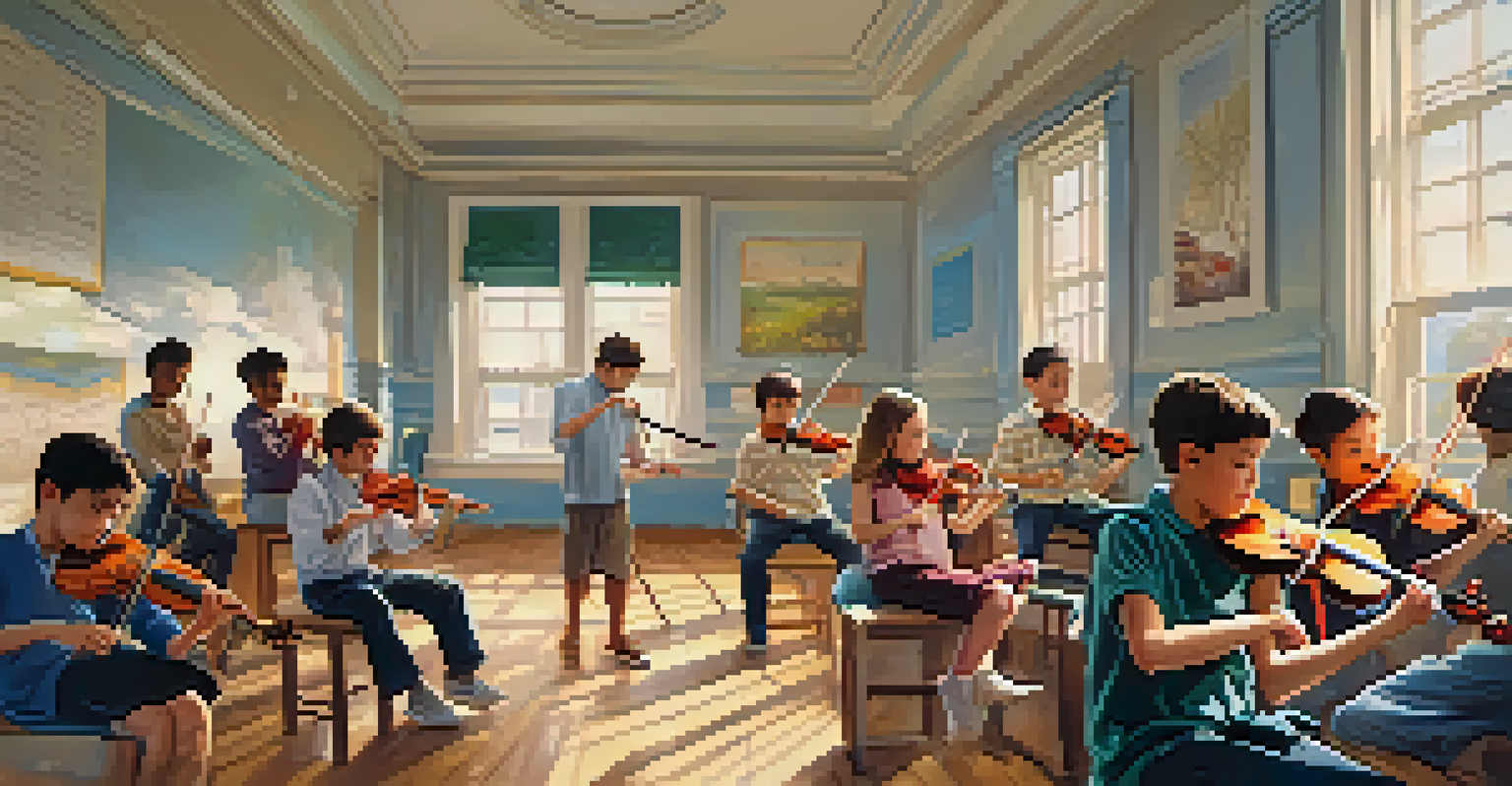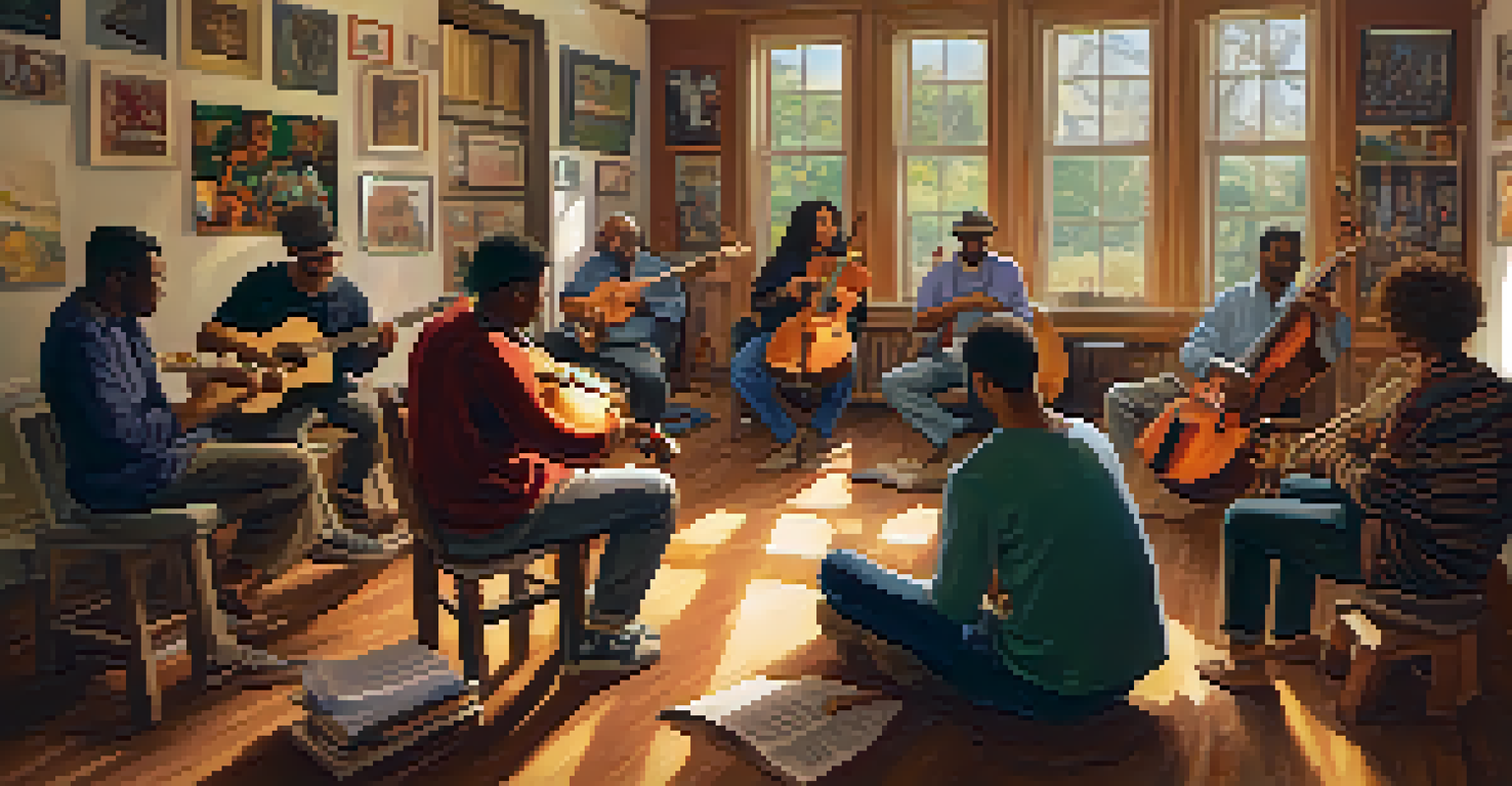Impact of Music Programs on California's Diverse Communities

Music Programs: A Cultural Bridge in California
California is a melting pot of cultures, and music programs serve as a vital bridge connecting diverse communities. These programs often incorporate various musical traditions, allowing participants to celebrate their heritage while learning from others. For instance, a local program might blend mariachi music with hip-hop, creating a unique fusion that resonates with multiple generations. This cultural exchange fosters understanding and respect among different groups, reinforcing the idea that music can transcend barriers.
Music can change the world because it can change people.
Through collaborative performances, participants not only showcase their skills but also share stories and experiences that highlight their backgrounds. Such interactions can break down stereotypes and encourage dialogue among community members. The impact is profound—kids learn to appreciate each other’s cultures while developing a sense of belonging in a diverse society. Ultimately, these music programs contribute to a more inclusive community atmosphere.
Moreover, the emotional and mental benefits of participating in music programs cannot be overstated. Engaging in music can provide a sense of purpose and belonging, especially for young people who may feel isolated. This shared experience can lead to lifelong friendships and a supportive network, enhancing social cohesion within California's vibrant communities.
Boosting Academic Performance Through Music Education
Research has shown that music education can lead to improved academic performance among students. In California, schools that incorporate music programs often see higher test scores and increased engagement in other subjects. For example, students involved in band or choir often develop better discipline and time management skills, which are crucial in academic settings. This connection highlights the importance of integrating arts into the educational curriculum.

Music programs also encourage creativity—an essential skill in today’s fast-paced world. When students explore music, they learn to think outside the box, which translates into better problem-solving abilities in their academic work. Schools that prioritize music education foster an environment where students feel empowered to express themselves, leading to enhanced critical thinking skills.
Music Programs Foster Community Bonds
California's music programs connect diverse communities by promoting cultural exchange and understanding.
Furthermore, the collaborative nature of music fosters teamwork and communication skills. As students learn to play in ensembles or participate in group performances, they develop a sense of responsibility and accountability toward their peers. These soft skills are invaluable, not just in school but throughout life, equipping students for future success in various endeavors.
Fostering Emotional Well-being Through Music
Music has a unique ability to express emotions and provide comfort, making it a powerful tool for mental health. In California’s diverse communities, music programs offer a safe space for individuals to process their feelings and experiences. Participants often describe moments of catharsis during rehearsals or performances, where they can release emotions that may be difficult to articulate otherwise. This emotional outlet can significantly enhance mental well-being.
The beautiful thing about learning is that no one can take it away from you.
Moreover, engaging with music can reduce stress and anxiety levels. Studies have shown that playing an instrument or participating in a group can trigger the release of endorphins, promoting a sense of happiness and relaxation. In a state as bustling as California, where life can be fast-paced and overwhelming, these music programs provide a much-needed reprieve for community members.
Additionally, the communal aspect of these programs fosters connections among participants, further supporting emotional health. Sharing experiences through music can create strong bonds, enabling individuals to feel less isolated in their struggles. This sense of community can be particularly vital for marginalized groups, ensuring they have access to resources that promote mental wellness.
The Economic Impact of Music Programs
Music programs in California not only enrich lives but also contribute significantly to local economies. These initiatives often require funding for instruments, instructors, and facilities, which can create jobs and stimulate business within communities. For instance, a new music program might lead to increased sales for local music shops and venues, fostering economic growth.
Additionally, music festivals and community concerts organized by these programs can attract visitors, boosting tourism and local businesses. This influx of people can lead to increased revenue for restaurants, hotels, and shops, creating a vibrant local economy. Communities that embrace music programs often find themselves revitalized economically, as the arts become a focal point for both residents and visitors.
Music Education Enhances Academics
Participation in music education correlates with improved academic performance and essential life skills.
Moreover, these programs can provide students with pathways to careers in the music industry, further enhancing economic opportunities. By nurturing talent and providing skills training, music programs empower young people to pursue professional aspirations in various fields, from performance to music production. This not only benefits individuals but also contributes to a thriving cultural economy in California.
Encouraging Diversity and Inclusion in Music
One of the most significant impacts of music programs is their commitment to diversity and inclusion. Many California music programs actively seek to include voices from underrepresented communities, ensuring that a variety of perspectives are celebrated. This dedication to inclusivity enriches the musical landscape and fosters a sense of belonging among participants.
When students from different backgrounds collaborate on music projects, they learn the value of diverse perspectives. This not only enhances their musical skills but also cultivates empathy and understanding, essential traits for navigating a multicultural world. Programs that prioritize diversity often lead to innovative musical creations that reflect the richness of the community.
Furthermore, by highlighting diverse musical traditions, these programs educate participants about the cultural significance of various genres. This knowledge promotes respect and appreciation for different heritages, creating a more harmonious society. In an age where division can seem prevalent, music programs serve as a unifying force that champions diversity.
Building Lifelong Skills Through Music Participation
Participating in music programs equips individuals with invaluable life skills that extend beyond the realm of music itself. Skills such as discipline, persistence, and teamwork are cultivated through practice and performance, shaping well-rounded individuals. For example, a student who practices their instrument regularly learns to manage their time effectively and prioritize their commitments.
Moreover, music fosters resilience, as individuals learn to cope with challenges such as mastering complex pieces or overcoming performance anxiety. These experiences teach participants how to handle setbacks gracefully, a skill that is beneficial in all aspects of life. The confidence gained through performing in front of an audience can also translate into improved public speaking and presentation skills.
Economic Growth Through Music Initiatives
Music programs stimulate local economies by creating jobs and attracting tourism through events and festivals.
Additionally, music programs encourage creativity and innovation, allowing participants to explore their artistic expression. This creativity is not just limited to music; it can inspire individuals to think outside the box in various fields, whether in academics or future careers. By nurturing these skills, music programs prepare participants for success in an ever-changing world.
Community Engagement and Support Through Music
Music programs often serve as a hub for community engagement, bringing people together and fostering collaboration. Events such as concerts, workshops, and open mic nights create opportunities for local residents to participate and connect with one another. This sense of community can be particularly impactful in areas with diverse populations, where individuals may feel disconnected from one another.
Moreover, these programs can inspire local partnerships between schools, businesses, and non-profit organizations, enhancing community support. Collaborations can lead to increased resources for music education, ensuring that programs remain accessible and sustainable. This collective effort highlights the importance of community involvement in nurturing the arts.

In addition, successful music programs can inspire other initiatives, leading to a ripple effect of community engagement. When residents see the positive impact of music programs, they may be motivated to support other cultural or educational initiatives. This interconnectedness reinforces the idea that community support is essential for the growth and enrichment of local culture.